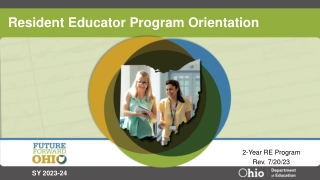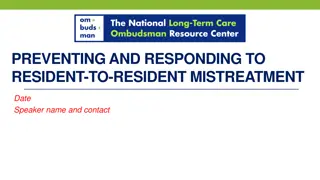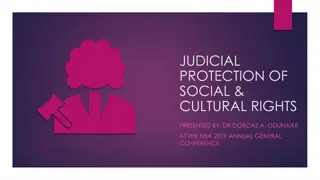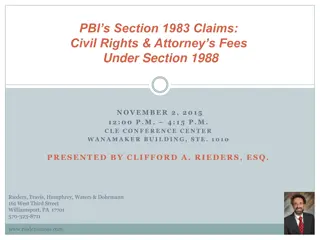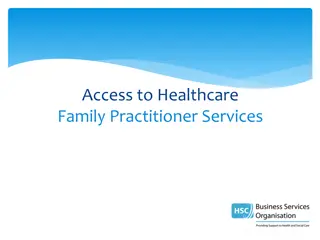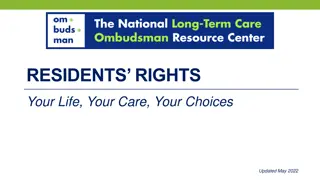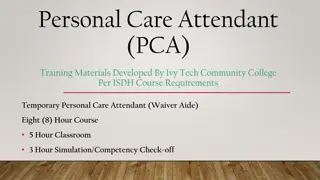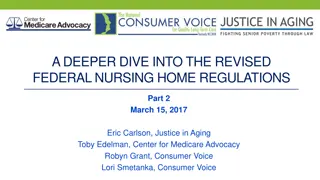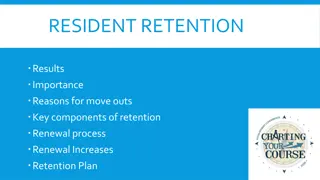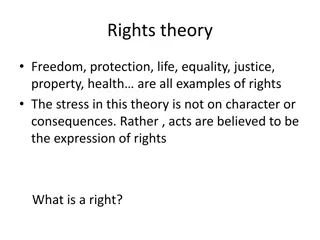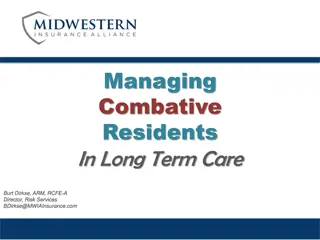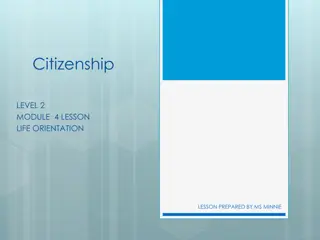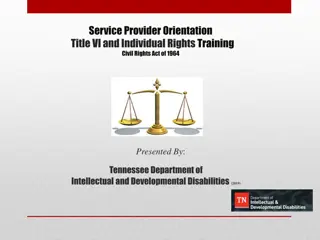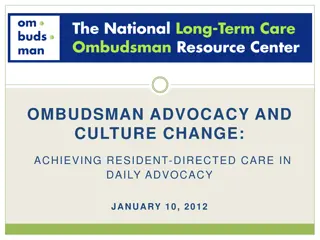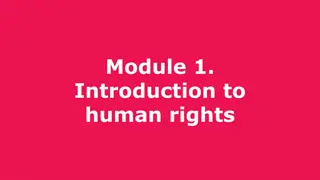Resident Educator Program Orientation
This orientation program provides information on the Ohio Resident Educator Program, including topics such as teacher residency and induction programs, mentoring principles, and the Resident Educator Summative Assessment (RESA). It also discusses the different types of Resident Educator Licenses and
1 views • 26 slides
Approaches to the study of Human Rights
The Marxist perspective on human rights emphasizes social rights over individual rights, viewing the full realization of self within society. Marx connects bourgeois society with human rights, highlighting how exploitation under capitalism alienates individuals. In contrast, the Third World perspect
5 views • 19 slides
Promoting Children's Rights in Education for Scotland's Learners
Raise awareness about Children's Rights, the United Nations Convention on the Rights of the Child, and how to embed them in education. Explore the importance of developing a culture that upholds rights-based practices and supports children in claiming their rights. Reflect on professional standards
1 views • 26 slides
Understanding Human Rights: Overview and Evolution
Human rights encompass various aspects such as human needs, generations of rights, individual status, and the indivisibility of rights. Dr. Anna Ledzi ska-Simon discusses the translation of human needs into rights, the historical evolution of rights across generations, individual rights according to
3 views • 17 slides
Understanding Human Rights in Queensland Government Work
The Human Rights Act of 2019 in Queensland outlines protected rights such as equality, freedom of expression, and fair trial. All public service employees must adhere to these rights, ensuring decisions and actions respect human rights. This act applies to everyone in the Queensland Government, with
2 views • 13 slides
Understanding the Basic Concept of Human Rights in Modern Jurisprudence
Human rights are natural and inalienable, essential for human life, based on universal principles. The concept of human rights is both simple and complex, requiring societal development and political will for implementation. Rooted in natural law theory, human rights have evolved from natural law to
1 views • 24 slides
Understanding Residential Status for Income Tax Purposes
Tax is levied on the total income of an individual based on their residential status as per the Income-tax Act, 1961. The Act classifies assessable persons into Ordinary Resident, Resident but not Ordinarily Resident, and Non-Resident. Residential status is determined by the physical presence of an
0 views • 26 slides
Test Your Knowledge: The Big Children's Rights Quiz
Test your knowledge of children's rights with "The Big Children's Rights Quiz." The quiz includes true or false questions related to the United Nations Convention on the Rights of the Child, government responsibilities, the importance of rights, and the concept of Duty Bearers. Explore these thought
0 views • 24 slides
Legal Rights and Options for Regional Center Clients in California
This document discusses the legal rights and options available for adult regional center clients in California, focusing on clarifying their rights, reviewing support systems, exploring alternatives to conservatorship, and explaining the conservatorship process. It also covers children's and adults'
1 views • 35 slides
Reflection on Human Rights and Criminals
Explore the complex question of whether criminals should have human rights, delving into the distinctions between absolute and non-absolute rights, and the impact of child labor on human rights. Consider the removal of certain rights from criminals and engage in critical thinking exercises regarding
1 views • 19 slides
Civil Rights Training Overview for SMP Participants
This civil rights training presentation covers the goals of civil rights, discrimination, protected classes, examples of discrimination, components of civil rights compliance, and the importance of equal access for all participants in the SMP program. It emphasizes equal treatment, knowledge of righ
0 views • 36 slides
Understanding Normal Human Microbiota and Its Role in Health
Normal human microbiota refers to the microorganisms residing on our skin and mucous membranes, playing vital roles in digestion, immunity, and protection against pathogens. They are categorized into resident and transient groups, with resident flora aiding in maintaining health by synthesizing nutr
0 views • 28 slides
Preventing and Responding to Resident-to-Resident Mistreatment in Long-Term Care Facilities
Resident-to-resident mistreatment (RRM) in long-term care settings can cause physical and psychological distress to residents. This presentation covers the definition of RRM, practical solutions for prevention, the importance of individualized care, and reporting procedures. Examples of RRM include
0 views • 27 slides
Judicial Protection of Social and Cultural Rights in Nigeria: Insights from NBA 2019 Conference
Discussing the judicial protection of economic, social, and cultural rights in Nigeria, focusing on the challenges, international law dimensions, violations, and the role of the judiciary in upholding social and cultural rights. The presentation highlights the need for accountability and protection
0 views • 20 slides
Challenges and Progress in 1920s American Civil Rights Movement
The 1920s in America saw significant changes in civil rights, women's movement, and prohibition. Civil rights encompass personal freedoms guaranteed by the U.S. Constitution, including freedom of speech, voting rights, and protection from discrimination. Violations of civil rights have occurred thro
1 views • 42 slides
Long-Term Care Regulation Provider Meeting Overview 2016
Long-term care regulation provider meeting in 2016 covered key scenarios like releasing or refusing readmission of residents, inability to meet resident needs, improved resident health, safety and health concerns, resident payment failures, and facility closure. Documentation requirements from physi
0 views • 23 slides
Understanding Section 1983 Claims and Civil Rights Attorney Fees
Section 1983 of the Civil Rights Act allows individuals to seek redress for violations of their constitutional rights by persons acting under state law. This provision does not create new rights but provides remedies for existing rights. The history of Section 1983 dates back to 1871 and has been in
0 views • 27 slides
Admission, Transfer, and Discharge Guidelines for Virtual Resident Family Action Council
Explore essential information on admission procedures, rights, services, and practitioner affiliations for Virtual Resident Family Action Council members. Understand the materials you should receive, refund and bed hold policies, assessments, and resident rights. Be informed before signing any agree
0 views • 52 slides
Liberal Democracy and Citizenship: Rights, Duties, and Participation
Citizenship in liberal democracies entails equal rights, duties, liberties, and constraints, with a focus on civil and political rights. The entrenchment of these rights has been key in establishing popular sovereignty and individual autonomy. Civil rights, developed in the 18th century, centered on
2 views • 16 slides
Understanding Access to Healthcare in Northern Ireland
Access to healthcare services in Northern Ireland is crucial for the well-being of residents and eligible visitors. Family Practitioner Services play a significant role in providing advice, training, and verification for entitlement to publicly funded healthcare. The main legislation, including the
0 views • 19 slides
Evolution of Human Rights: From Ancient Times to Modern Era
Throughout history, ideas of rights and liberty have evolved, leading to the recognition of universal human rights in the modern sense. The concept of human rights can be traced back to significant historical events such as the English Bill of Rights, the Virginia Declaration of 1776, and the French
0 views • 7 slides
Understanding Citizenship and Immigration in Modern Democracies
Citizenship, a fundamental institution of modern democracies, defines the relationship between individuals and the state through reciprocal rights and duties. However, citizenship has a dual nature, serving to both include certain individuals as citizens and exclude others. Immigrants residing withi
0 views • 21 slides
Human Rights and Citizenship Rights in Leisure, Sport, and Tourism: A Historical Perspective
This text delves into the intersection of human rights, citizenship rights, and leisure activities like sports and tourism. It explores the definitions, history, and declarations related to human rights, emphasizing the importance of allowing individuals the freedom to pursue leisure activities with
0 views • 20 slides
Understanding Residents Rights in Nursing Homes
Residents of nursing homes have additional rights beyond their rights as U.S. citizens. These rights, protected by federal law, ensure that residents are treated with dignity, have self-determination, make choices, receive information, and have access to communication and services. Exercising these
0 views • 40 slides
Overview of International Human Rights Law and Treaties
This comprehensive overview delves into the foundations of international human rights law, exploring key documents such as the Universal Declaration of Human Rights, the International Bill of Rights, and various human rights treaties addressing discrimination, women's rights, children's rights, migr
0 views • 27 slides
Temporary Personal Care Attendant Training Program by Ivy Tech Community College
This training program, developed by Ivy Tech Community College as per ISDH course requirements, is designed for Temporary Personal Care Attendants (Waiver Aides) to address staffing shortages due to the COVID-19 pandemic. Candidates must be at least 16 years old with no specific educational requirem
0 views • 71 slides
Understanding the Revised Federal Nursing Home Regulations
Delve into the revised federal nursing home regulations introduced in 2016 and implemented in three phases. Learn about key aspects such as resident rights, admission procedures, waivers of rights, responsibilities for resident property, and more, as discussed by experts in the field.
0 views • 33 slides
Enhancing Resident Retention Strategies for Property Managers
Explore the importance of resident retention, key components of successful programs, reasons for move-outs, and ways to improve retention rates. Learn how to create a welcoming environment, utilize customer service, enhance maintenance follow-ups, and boost resident satisfaction to stabilize propert
0 views • 15 slides
Understanding Rights Theory and its Significance in Society
Rights theory emphasizes the importance of fundamental rights such as freedom, protection, life, equality, justice, property, and health. It traces back to contract theories of politics and delves into the concept of natural and conventional rights, both positive and negative. The theory posits that
0 views • 5 slides
Evolution of Human Rights Protection in the EU
The journey of human rights protection in the EU, from the absence of explicit rules to the affirmation of fundamental rights by the CJEU, influenced by case law and the evolution from judicial to codified protection. National courts' concerns on ensuring consistency with constitutional values led t
0 views • 9 slides
Graduate Non-Resident Tuition Exception Form Overview
Explore the Graduate Non-Resident Tuition Exception Form, an online tool for submitting requests for non-resident tuition waivers. This comprehensive guide covers the form's structure, pre-populated sections, requester and student information input, funding request details, and the submission proces
0 views • 23 slides
Overview of the African Commission on Human and Peoples' Rights
The African Commission on Human and Peoples' Rights was established to promote and protect human rights across Africa. The African Charter, which entered into force in 1986, emphasizes civil and political rights, including freedom from discrimination, equality, life, personal integrity, and various
0 views • 27 slides
The Significance of Human Rights in the Modern World
Human rights are fundamental rights that belong to all individuals, are inalienable, indivisible, interconnected, and should be respected without prejudice. The Universal Declaration of Human Rights, adopted in 1948 after WWII by the United Nations, is a crucial milestone document emphasizing human
0 views • 5 slides
Managing Combative Residents in Long-Term Care
Residents in long-term care facilities may exhibit combative behaviors due to underlying psychiatric conditions, cognitive impairment, or dementia. This aggression poses challenges for both staff and other residents. Caregiver training is crucial for identifying triggers and managing combative episo
0 views • 17 slides
Enhancing Transparency in Human Rights Performance Measurement
This information focuses on initiatives like the Human Rights Measurement Initiative (HRMI) that aim to provide new data for researching and advocating human rights issues globally. The HRMI project, founded in 2015, collaborates with various stakeholders and is funded by philanthropic grants. It em
0 views • 19 slides
The Bill of Rights: Summary of Constitution Amendments
The Bill of Rights comprises the first ten amendments to the United States Constitution. These amendments guarantee various fundamental rights and protections to American citizens. Amendment I protects religious freedoms, free speech, and the right to assemble. Amendment II safeguards the right to b
0 views • 11 slides
Understanding Citizenship Rights in South Africa
South Africa's Constitution guarantees various rights and freedoms to all citizens, ensuring equality, dignity, and protection. The Bill of Rights enshrines over 25 fundamental rights, emphasizing equality before the law and prohibiting unfair discrimination based on various grounds. The Constitutio
0 views • 49 slides
Understanding Human and Civil Rights in DIDD Services
Protecting the rights of individuals receiving Department of Intellectual and Developmental Disabilities (DIDD) services is essential. This training covers Title VI and individual rights under the Civil Rights Act of 1964, emphasizing equality and access to programs regardless of race, color, sex, d
1 views • 31 slides
Transforming Long-Term Care: Resident-Directed Culture Change
The content discusses the crucial shift towards resident-directed care in long-term care facilities through culture change practices, emphasizing person-first language, resident empowerment, and system improvements. It explores the philosophy, practices, and language adaptations necessary to enhance
0 views • 31 slides
Understanding Human Rights: Module 1 Overview
This module serves as an introduction to human rights principles, instruments, and monitoring mechanisms. It covers the definition of human rights, the Universal Declaration on Human Rights, key principles, and state obligations. Human rights are universal legal guarantees that protect individuals a
0 views • 21 slides
